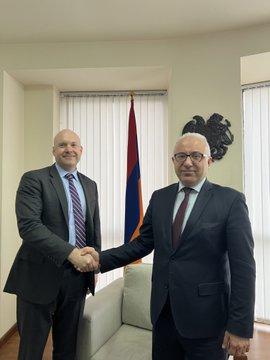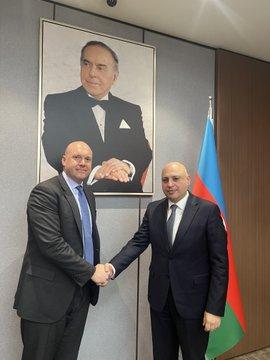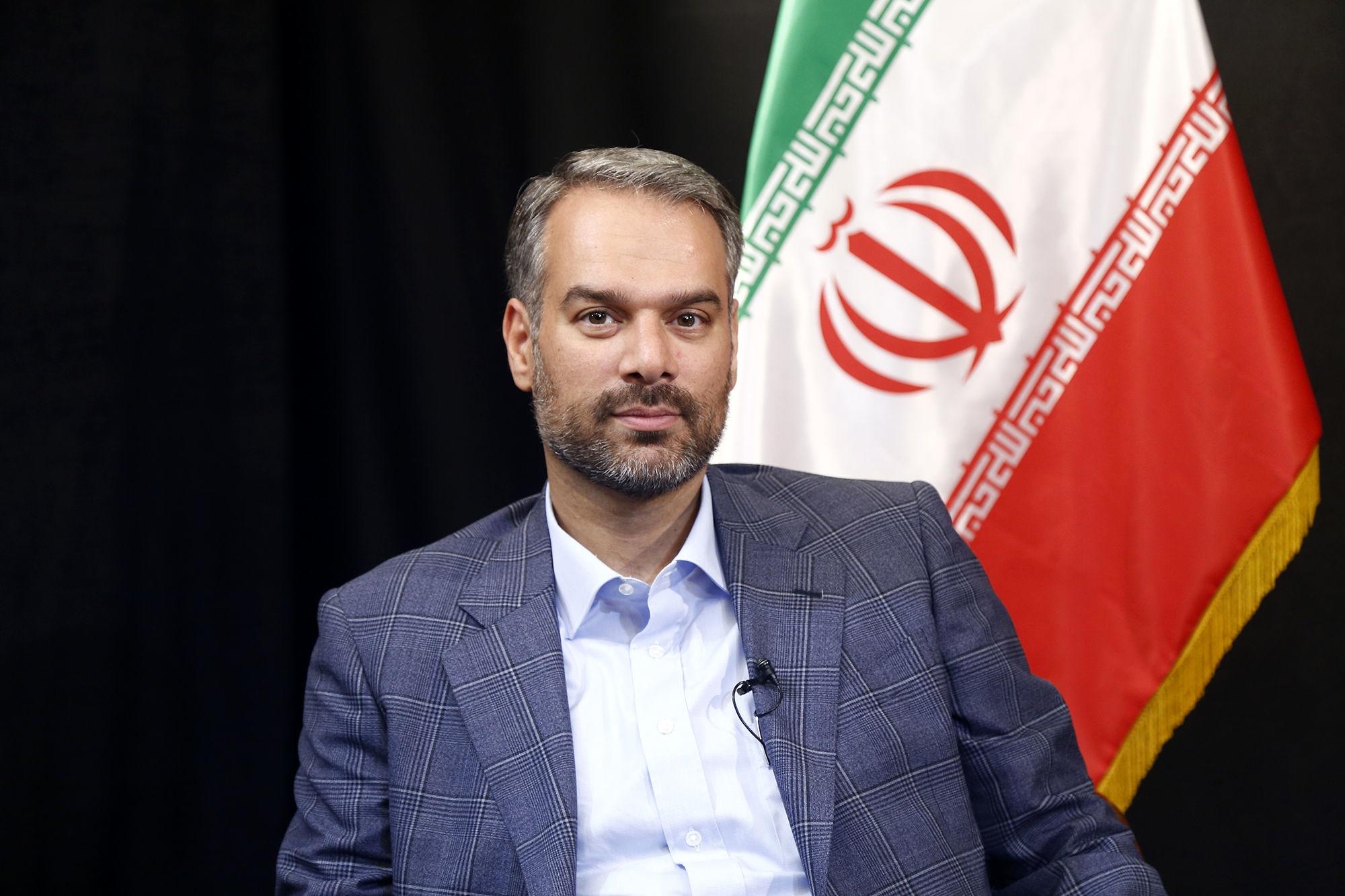US special envoy's South Caucasus diplomatic tour shrouded in secrecy Details remain veiled
US Deputy Special Envoy for Iran Abram Paley embarked on a surprise diplomatic tour across the South Caucasus region, encompassing visits to Yerevan, Tbilisi, and Baku. Throughout his journey, Abram Paley engaged in a series of high-level meetings with government officials, and representatives from the banking sector to discuss Iran’s presence in the South Caucasus nations and possible threats it may pose to them and the wider region.
Armenia
In Yerevan, Paley's discussions spanned a range of critical topics, including Iran, border security, and sanctions enforcement. However, despite the significance of these discussions, issues mulled received notably low-key coverage from Armenian media. The subdued media coverage could be largely attributed to Tehran's substantial influence on Yerevan and a cautious stance aimed at avoiding antagonizing Iran.
It's widely acknowledged that Iran holds significant sway over Armenia, with Tehran's economic impact permeating various sectors of Armenian society. This influence manifests in Armenia's cautious diplomatic maneuvers, particularly concerning contentious issues such as the opening of the Zangazur Corridor from Azerbaijan to its Nakhchivan exclave. The attribution of the matter to Tehran's "red line" underscores Iran's considerable influence over its smaller neighbor, shaping Armenia's foreign policy considerations and limiting its autonomy in regional affairs.
The Armenian government's delicate balancing act between its strategic interests and maintaining positive relations with Iran reflects the intricate geopolitical landscape of the region. While Armenia seeks to diversify its economic and diplomatic ties, it remains cognizant of the potential repercussions of provoking Tehran. The dynamic underscores the complex web of interdependencies and power dynamics shaping Armenia's foreign policy decisions, highlighting the multifaceted nature of its relationship with Iran at a time when the Pashinyan government keeps claiming closer integration into the West.


In Yerevan, Paley met with Armenian Deputy Foreign Minister Mnatsakan Safaryan and officials from the National Security Council (NSC), the Central Bank, and the State Revenue Committee. The discussions in Yerevan centered on Iran, border security, sanctions enforcement, and Armenia's endeavors towards economic and foreign policy diversification.
Speaking from Armenia’s central square, Paley highlighted issues discussed in Yerevan, stating, “We are here in Armenia to discuss Iran and its range of destabilizing behavior around the world. We met with the NSC, the MFA, the Central Bank, and the State Revenue Committee to discuss a range of issues, including border security, sanctions enforcement, human rights, and our concerns about Iran’s provision of support to Russia and terrorist groups around the world.”
Amid such developments, most banks in Armenia have declined to engage with the Russian Mir payment system since March 30. On the other hand, with Iran’s active role in the Armenian economy, Bank Mellat of Iran has operated in Armenia since 1996 and maintains close collaboration with both Armenian and Russian banks through Iran's Shetab payment system. The alignment of the Mir and Shetab systems is also under discussion between Iran and Russia, as evidenced by a recent meeting between Iran's ambassador to Russia Kazem Jalali, and Russian Central Bank governor Elvira Nabiullina.
Considering Iran and Armenia's support for Russia's evasion of sanctions and provision of military products, there is a potential to apply pressure on banking and financial systems in Tehran and Yerevan.
Georgia
In Tbilisi, Abram Paley said he had productive meetings with notable figures from the Georgian Foreign Ministry, and the National Bank of Georgia, as well as representatives from the private sector. Despite the significance of the discussions, the visit and issues mulled were not widely covered in the media.


From Tbilisi, Georgia, standing on a bridge over the Kur River, Abram Paley stated, “We are continuing our diplomatic engagement in the Caucasus, here in Georgia where we had productive meetings with the MFA, National Bank of Georgia, and commercial banks on sanctions compliance and our concerns about Iran’s broader destabilizing behavior.”
Azerbaijan
On the final leg of his three-nation tour, in Baku, Paley met with Azerbaijani officials, including presidential aide Hikmat Haciyev, Deputy Foreign Minister Samir Sarifov, and the Azerbaijani ambassador to Iran Ali Alizada. Discussions revolved around various topics such as Iran, sanctions enforcement, and regional stability. This engagement highlighted Azerbaijan's strategic importance in addressing regional challenges posed by Iran's policies and activities.
In Baku, standing outside the capital’s monumental Maiden Tower, Paley stated, “We are finishing our current trip to the Caucasus here in Azerbaijan where we had very productive meetings with the Presidential Administration, the MFA, commercial banks, and foreign partners on Iran and concerns about its destabilizing behavior.”
The unannounced visit of US Deputy Special Envoy for Iran Abram Paley to Azerbaijan and his meetings are undoubtedly intriguing, although it is challenging to speculate on the specifics of these meetings. The fact that the Azerbaijani embassy in Tehran has not yet resumed its activities, coupled with doubts raised by Iranian media reports citing some reliable sources within the Iranian Foreign Ministry claiming that the embassy of Azerbaijan in Iran will soon resume its activities, adds to the complexity.

In essence, the meeting Paley had with Azerbaijani ambassador to Iran Ali Alizada is also intriguing though he has not been in Tehran since the January 27, 2023, terror accident at the embassy.
Regarding the meeting with Azerbaijani officials and representatives of the banking sector, Abram Paley indicated during his comment outside the Maiden Tower in Baku that the purpose of his visit was to discuss potential methods for Iran to circumvent sanctions. It is noteworthy that Iran currently does not have any operational banks in Azerbaijan, and the branch of Iran Melli Bank was closed following the terrorist attack on the Azerbaijani embassy.
Political experts assert that discussions in Azerbaijan may also address Iran's detrimental role in the region and the regime's aggressive policies toward Muslim countries opting for secular development paths over false ideological values.
Paley meets Deek: Why?
Paley also held talks with Israeli Ambassador to Azerbaijan George Deek, emphasizing the ongoing coordination between the USA and Israel in addressing shared concerns regarding Iran's destabilizing behavior in the region.
This meeting is more of a message as there is no need to visit Azerbaijan to discuss issues between the USA and Israel. This message is probably related to the death of Iranian high-ranking officers as a result of an attack by the Israeli army on the consular department of the Iranian embassy in Damascus. In connection with this incident, the protection of diplomatic representations of Israel, especially in the countries bordering Iran, has been strengthened.

Furthermore, Paley's meeting with Israeli Ambassador to Azerbaijan, George Deek, highlights the ongoing coordination between the US and Israel in addressing shared concerns regarding Iran's destabilizing behavior in the region. This collaboration underscores the complex geopolitical dynamics at play, where regional actors align to counter perceived threats from Tehran amid Iranian MP Jalal Rashidi Koochi's recent tweet, suggesting a retaliatory attack on the Israeli embassy in Baku following the missile strike on the Iranian consulate.
In his tweet, Rashidi Koochi emphasized the urgency for a swift and decisive response to the Israeli attack. He highlighted that any delay in a robust retaliation would tarnish Iran's reputation and dignity and openly proposed targeting one of the diplomatic outposts of Israel in a regional country, preferably in Azerbaijan.

Overall, Paley's diplomatic tour underscored the complex geopolitical dynamics at play in the South Caucasus, where regional interests, security concerns, and economic considerations intersect.
Constructive trip to the South Caucasus, where I met with senior officials and the private sector to discuss the Iranian regime, sanctions enforcement, and ongoing efforts to address the regime’s destabilizing behavior. The U.S. aims to work with our partners to advance a… pic.twitter.com/EzQxtzpN4q
— Office of the Special Envoy for Iran (@USEnvoyIran) April 1, 2024








